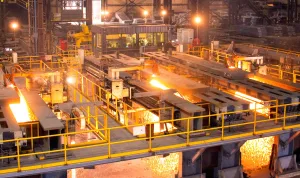How Geopolitical Events in Asia Impact Hong Kong’s Steel Market: A Comprehensive Analysis

Geopolitical events in Asia have a profound effect on Hong Kong’s steel market. As a strategic hub for trade and industry, Hong Kong’s steel sector is highly sensitive to changes in regional dynamics, including trade disputes, diplomatic tensions, and shifts in policy among neighboring countries. In this article, we will explore how various geopolitical factors shape Hong Kong’s steel market and what this means for businesses and investors in 2024.
1. Trade Disputes and Tariffs
One of the most direct ways geopolitical events affect Hong Kong’s steel market is through trade disputes and tariffs. As the steel industry is heavily reliant on both imports of raw materials and exports of finished products, any disruptions in trade relations can have an immediate impact. For example, tensions between China and the United States have resulted in tariffs on steel and related products, affecting Hong Kong’s ability to access key markets. Additionally, trade barriers with other major players in the region, such as Japan or South Korea, could further limit Hong Kong’s steel trade, driving up costs and reducing profitability.
2. China’s Influence on Regional Steel Supply
China plays a dominant role in Asia’s steel industry, and its geopolitical strategies directly influence Hong Kong’s market. As the largest steel producer in the world, China’s policies regarding production levels, export quotas, and raw material prices can send shockwaves through the region. In recent years, China has implemented measures to reduce steel production as part of its environmental goals, which has led to increased prices for raw materials like iron ore. Hong Kong, dependent on these supplies, faces higher production costs when China adjusts its industrial policies in response to global geopolitical events.
3. Regional Tensions Affecting Trade Routes
Another significant factor is the impact of regional tensions on trade routes. Hong Kong’s steel industry depends on the smooth functioning of shipping lanes and transportation networks across Asia. Conflicts or diplomatic tensions in areas such as the South China Sea, a vital corridor for international trade, can disrupt the flow of goods, including steel and its raw materials. In 2024, any escalation of territorial disputes or military activity in this region could lead to delays and increased costs for Hong Kong’s steel industry, affecting delivery schedules and market competitiveness.
4. Belt and Road Initiative
China’s Belt and Road Initiative (BRI), a vast infrastructure project that spans across Asia and beyond, is another geopolitical factor influencing Hong Kong’s steel market. As China invests in infrastructure projects throughout the region, the demand for steel is expected to rise. Hong Kong, positioned as a gateway between China and other Asian markets, could benefit from this increased demand. However, the success of the BRI is tied to the geopolitical stability of the countries involved. Political unrest or economic sanctions in countries participating in the initiative could hinder project completion, thereby reducing steel demand and affecting Hong Kong’s exports.
5. Sanctions and International Relations
International sanctions on Asian countries can also have ripple effects on Hong Kong’s steel market. For instance, sanctions imposed on North Korea or Russia can alter trade flows, as countries impacted by these restrictions seek alternative sources for steel or raw materials. Hong Kong, as an intermediary in regional trade, may face challenges in navigating these shifting markets, particularly if global powers impose new sanctions or restrictions on its trading partners. These uncertainties can create volatility in steel prices and supply availability, complicating long-term planning for Hong Kong’s steel companies.
6. Economic Partnerships and Free Trade Agreements
On the positive side, geopolitical developments can also open up opportunities for Hong Kong’s steel market through economic partnerships and free trade agreements. The Regional Comprehensive Economic Partnership (RCEP), for instance, is a major trade agreement between 15 Asia-Pacific countries, including China, Japan, and South Korea. This agreement is expected to boost trade among member nations, including steel products. Hong Kong’s close economic ties with China position it well to benefit from the increased trade facilitated by RCEP, helping it navigate some of the geopolitical challenges in the region.
Conclusion
Geopolitical events across Asia play a critical role in shaping the future of Hong Kong’s steel market. From trade disputes and tariffs to regional tensions and international sanctions, the steel industry must remain agile and adaptable in the face of constant change. Understanding these geopolitical influences is essential for businesses and investors seeking to mitigate risks and capitalize on opportunities in 2024. As Asia’s geopolitical landscape continues to evolve, Hong Kong’s steel market will need to navigate both challenges and potential growth avenues to remain competitive on the global stage.



